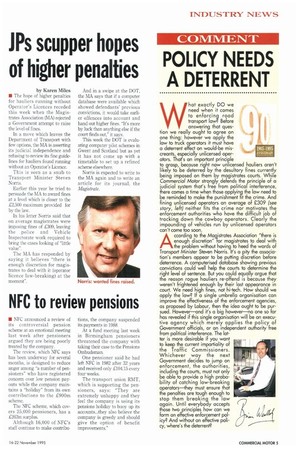COMMENT
Page 7

If you've noticed an error in this article please click here to report it so we can fix it.
POLICY NEEDS A DETERRENT
What exactly DO we need when it comes to enforcing road transport law? Before answering that question we really ought to agree on one thing: however we apply the law to truck .operators it must have a deterrent effect on would-be miscreants, especially unlicensed operators. That's an important principle to grasp, because right now unlicensed hauliers aren t likely to be deterred by the desultory fines currently being imposed on them by magistrates courts. While Commercial Motor strongly defends the principle of a judicial system that's free from political interference, there comes a time when those applying the law need to be reminded to make the punishment fit the crime. And fining unlicensed operators an average of 2309 (see story, left) neither fits the crime nor motivates the enforcement authorities who have the difficult iob of tracking down the cowboy operators. Clearly the impounding of vehicles run by unlicensed operators can't come too soon.
According to the Magistrates Association "there is enough discretion" br magistrates to deal with the problem without having to heed the words of Transport Minister Steven Norris. It's a pity the association's members appear to be puffing discretion before deterrence. A computerised database showing previous convictions could well help the courts to determine the right level of sentence. But you could equally argue that the reason rogue hauliers re-offend is because they weren't frightened enough by their last appearance in court. We need high fines, not hi-tech. How should we apply the law? If a single umbrella organisation can improve the effectiveness of the enforcement agencies, as proposed by Labour, then the idea ought to -.be pursued. However—and it's a big however—no one so far has revealed if this single organisation will be an executive agency which merely applies the policy of Government officials, or an independent authority Free from political interference. The latter is more desirable if you want to keep the current impartiality of the Traffic Commissioners. Whichever way the next Government decides to jump on enforcement, the authorities, including the courts, must not only be able to provide a high probability of catching law-breaking operators—they must ensure that the penalties are tough enough to stop them breaking the law again. Until everybody accepts those Iwo principles how can we Form an effective enforcement policy? And without an effective policy, where's the deterrent?
1905-1995 ANSIVFAIRY




























































































































